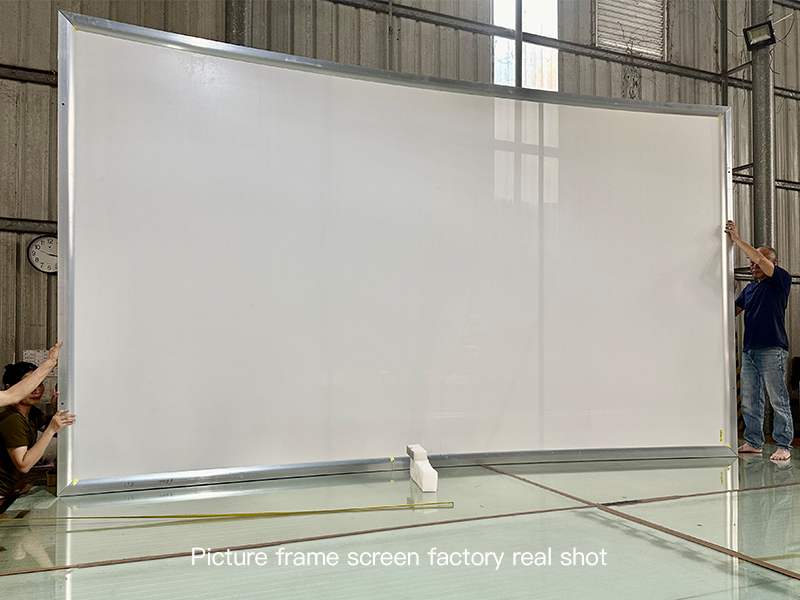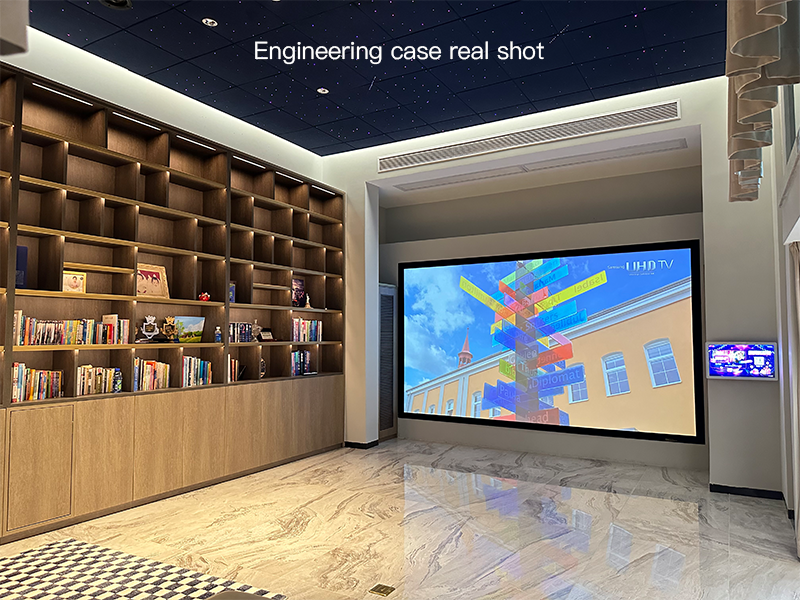
When building a home theater, screen selection is often more confusing than choosing a projector: Want to hide speakers without sacrificing sound quality? Tired of blurry edges on large screens? The solution lies in choosing the right acoustic transparent and curved projection screens. This article uses 2025’s latest industry data to break down the selection logic in simple terms.
1. Acoustic Transparent Projection Screens: The Secret to “Sound Through” Images
Core Value: The Key to Sound-Image Integration
Many mistakenly think these screens just “make speaker placement easier,” but their real role is achieving sound-image unity. Hiding front and center speakers behind the screen on the same horizontal line lets dialogue come directly from the center of the image—the key to cinema-level immersion. Imagine watching Dune 2: the protagonist’s lines originate from the screen itself, not side speakers.
Comparison of Three Types
| Type | Core Advantage | 2025 Latest Specs | Ideal Scenarios | Notes |
|---|---|---|---|---|
| Woven Acoustic | Uncompromised sound quality | Gain 0.8-1.0, Viewing angle 160° | Hi-Fi home theaters prioritizing audio | Screens over 150″ need high-lumen projectors |
| Micro-perforated | Sharp, grain-free images | Hole size 0.15-0.5mm, 5% open area | 4K/8K high-def viewing | Professional craft to avoid moiré |
| Metal 3D Acoustic | Stunning 3D, high contrast | Gain 1.5, Color gamut ≥90% DCI-P3 | 3D-focused home theaters | Avoid direct on screen |
2025’s high-end models feature 0.15mm ultra-micro holes, invisible from 3-5m away and compatible with 16K resolution. Watch for woven screens with false gain claims—quality ones reach 0.9, while budget versions only hit 0.7.
3 Buying Tips
- Prioritize hole density: Choose over 100,000 holes per square inch for balanced sound and brightness.
- Match viewing distance: 0.5mm holes need ≥3m distance; 0.4mm works at 2.5m.
- Acoustic compensation: Use AV receiver equalizers to offset minor high-frequency loss.

2. Curved Screens: The “Clarity Code” for Large Screens
Why Curved for Big Screens?
For screens over 180″ or 2.35:1 aspect ratios, flat screens suffer “clear center, blurry edges”—the projector lens distance to center vs. edges differs too much. Curved screens equalize this distance, solving focus issues perfectly. Like IMAX theaters, every seat gets sharp visuals.
Rigid vs. Flexible Screens
- Rigid screens: Sturdy base for maximum flatness, ideal for dedicated home theaters with “room-in-room” soundproofing.
- Flexible Frame Projection Screen: Aluminum frames, customizable curvature, great for living rooms blending decor.
2025 customization lets you tailor curvature (1.5-2x viewing distance recommended), resolution compatibility, and room height.

3. FAQ
Q1: Will acoustic screens reduce image brightness?
A1: Quality models limit brightness loss to ≤10%. Water-soluble coating micro-perforated screens preserve brightness and sound, plus they’re odor-free. Pair with ≥1000nits laser projectors for daytime viewing.
Q2: Is a curved screen suitable for small spaces?
A2: Yes, for spaces over 20㎡. A 120″ 2.35:1 curved screen only needs 3.2m minimum viewing distance.
Q3: Limited budget—acoustic or curved first?
A3: Prioritize acoustic. Sound improvement impacts immersion more than edge clarity. For both, choose a custom curved acoustic rigid screen.
Conclusion
Acoustic screens deliver sound-image sync;curved projection screens ensure full-screen clarity. 2025 screen customization offers precision—from 0.15mm micro-holes to tailored curvature—all designed for your space, equipment, and viewing habits. Choose wisely for cinema-level home entertainment.


